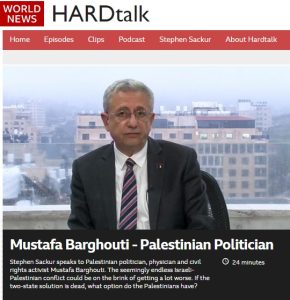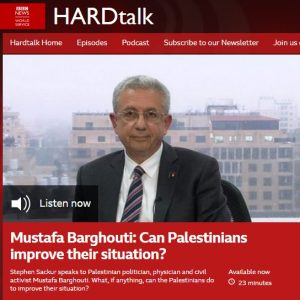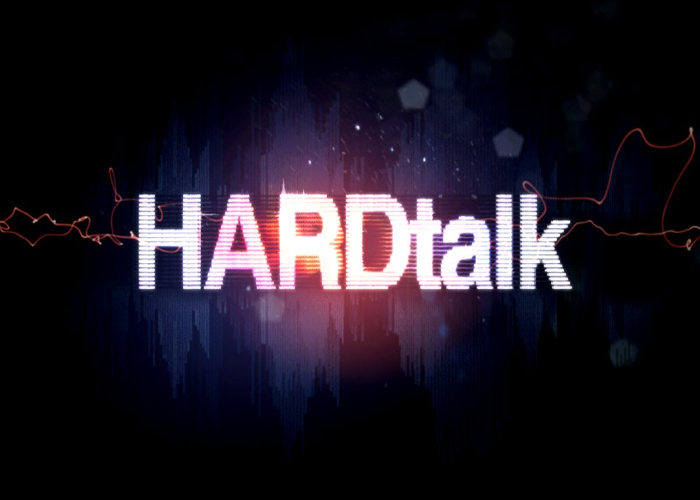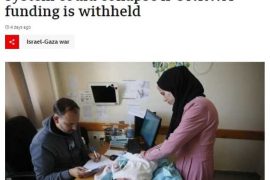The Palestinian politician Mustafa Barghouti has appeared so many times in BBC content over the years that his anti-Israel propaganda and partisan talking points are tediously predictable. Nevertheless, the BBC programme ‘Hardtalk’ chose to once again provide him with a platform on March 16th and 17th [televised BBC News channel version here, BBC World Service radio version here].
The introduction provided by presenter Stephen Sackur for the radio version was longer than that in the filmed programme and included portrayal of the Oslo Accords (signed on the White House lawn) as “secretive” and linkage to the concept of the two-state solution, despite the fact that it does not appear in those agreements. [emphasis in italics in the original, emphasis in bold added]
Sackur: “…My guest today perhaps takes some grim satisfaction from the fact that his political pessimism some three decades ago has proven well justified. Back then, the Palestinian physician, politician and civil rights activist Mustafa Barghouti condemned the secretive Oslo peace deal between the Palestinian leader Yasser Arafat and the Israeli government led by Yitzhak Rabin as a mistake and a betrayal of Palestinian aspirations. Sure enough, over the following years the high hopes for Oslo – that it would lead to a lasting two-state solution – have been dashed. Palestinians post Arafat have been left with a Palestinian Authority which has lost any claim to democratic legitimacy, long ago ceded control of Gaza to the Islamists of Hamas and has failed to stop Israel massively expanding its settlement programme in the occupied West Bank. As of last year Israel has the most Right-wing, hawkish government in its history while the Palestinian Authority is led by 87 year-old Mahmoud Abbas whose main focus seems to be trying to maintain his fragile grip on his office. There are signs that many young Palestinians in the West Bank now see a return to armed struggle as their only option. Decades of hostility and sporadic violence could morph into something much worse. Does Mustafa Barghouti – who talks the language of civil resistance, not armed conflict – have concrete ideas that stand a chance of improving his people’s situation?”
Sackur made no effort to clarify that the current wave of violence can be traced back to May 2021 and did not erupt following the formation of the Israeli government which took office in late December 2022. Contrary to the impression given in the last sentence of that introduction, Sackur’s interviewee had no “concrete ideas” to present – only distortions of history intended to blame Israel alone for the continued conflict and ample promotion of buzz words and baseless smears.
Sackur: “…Let’s start with the situation in the West Bank, where you sit, in Ramallah. Is there any semblance of political authority or control in the West Bank right now?”
Barghouti: “Unfortunately, the existing authority is the authority of occupation, Israeli military occupation, which is really, from security perspective, controlling the whole area. The Palestinian Authority has been weakened dramatically by the Israeli side. Since 2002, when the Israeli army re-invaded all Palestinian cities and all the so-called Area A, which is supposed to be under Palestinian Authority, since then, practically, the Palestinian Authority is an authority under military occupation, under Israeli occupation. So it’s an authority without real authority.”
Sackur refrained from reminding audiences that 2002 was the height of the second intifada which had been initiated by the Palestinians and that Operation Defensive Shield was a response to virulent Palestinian terrorism. Neither did he bother to point out that Area A is not “under military occupation”.
Sackur: “I just want to be clear about what you’re saying. Are you saying, in essence, the Palestinian Authority – created, of course, through that Oslo Process – is dead?”
Barghouti: “It’s not dead. It continues to try to do as much as it can in terms of civilian work and taking care of education, taking care of health care, in cooperation with Palestinian civil society. But it is deprived from any ability even to be in Area C, which is about 62% of the West Bank. It is prevented from being able to do anything inside East Jerusalem, which is also occupied. And even in Area A, they are running civil affairs, but they don’t have real authority over security matters. That is the reality.”
Audiences were not informed by Sackur that under the terms of the Oslo Accords Area C is under full Israeli control pending final status agreements or that the PA is responsible for security in Area A, even if it chooses to act according to that obligation.
Sackur: “What about basic legitimacy? I mean you sit with me, nominally, as a Palestinian MP, a member of the Palestinian legislature. But of course, there haven’t been elections since 2006. And Mahmoud Abbas has been leader of the Palestinian Authority since 2005, and there hasn’t been elections for his post either. So there is a fundamental lack of legitimacy, isn’t there?”
Barghouti: “Absolutely. I agree with you. And as you know, we belong to democratic opposition in Palestine, as Palestinian National Initiative, and we’ve been calling all these years for having democratic elections. It is unacceptable and it’s not correct not to have elections for all these years, since 2006. The outcome, especially after the fact that the president dissolved the parliament – illegally, in our opinion. Since then, we have no separation of powers between executive, legislative and judiciary powers. And that’s why we need elections so much. But also, I must say, I do blame the Authority for not doing elections, but I also blame Israel, which is doing everything it can to prevent elections from taking place. And that’s why, in 2021, when we were about to have elections, Israel insisted not to allow elections in Jerusalem, which was, of course, used as an argument not to have elections. But in principle, I believe we should have elections despite Israeli rejection. We should not give Israel the veto power over our democratic life, and we should conduct elections in Jerusalem as an act of nonviolent resistance. And let them be…”
BBC audiences did not hear any challenge from Sackur to that spin concerning Abbas’ cancellation of the 2021 election.
As has lately become the norm in BBC content, neither did they receive any information concerning the funders and suppliers of weapons to the “very well armed” terrorists that he went on to mention.
Sackur: “If I may… We’ll get back to your political solutions, as you see them, in a moment. But let’s stick with, actually, the issues of raw power and control, because it seems to me, right now, in towns and cities across the West Bank, including Nablus, Jenin, Hebron as well, the real power increasingly lies with young, militant Palestinians who are very well armed and over the last few months have shown a new willingness to engage in armed struggle with the Israeli military, but also to target Israeli Jewish civilians as well. Would you agree that that is a new and very striking phenomenon?”
Barghouti of course deflected audience attentions away from the issue of the PA’s loss of control in the areas in which it is responsible for security and Hamas’ enabling and encouragement of terrorism to the chronologically irrelevant topic of Israel’s government while repeatedly promoting the ‘apartheid’ smear unchallenged.
Barghouti: “I would describe it in a different way. I will say that what we see here in Palestine is…who came to power in Israel is the most, as you said, the most extreme government in the history of this region. But not only that, it’s a government with fascist elements in it. Smotrich, who is the second most powerful man in this government, described himself as a fascist. And this government, Smotrich, says to Palestinians that you cannot have a state. They say that they should continue to build settlements. His plan is, as he said, is to flood the West Bank with settlers and settlements so that Palestinians would eventually conclude that they cannot have a state of their own, and they would have one of three options – either to emigrate or to die or to accept a life of subjugation to the system of Israeli apartheid and occupation. The young Palestinians understood that, and that’s why the young Palestinians, this young generation, will not accept to be slaves of a system of occupation and apartheid. They realised that the whole so-called peace process has failed dramatically. Oslo is dead because of Netanyahu in particular, and the Israeli government, which blocked any possibility for negotiations or peace in this region. And Palestinians realise something they realised in the first intifada, which is that they have to self-rely…rely on themselves, they have to self-organise, and they have to defy this system of occupation and apartheid. That’s why you see many younger people turning in that direction. But to say that this…”
Sackur once again avoided the issue of the Palestinian initiated second intifada which brought the Oslo process to a halt and failed to challenge Barghouti’s inaccurate claim that Israel alone is responsible for the absence of negotiations.
Sackur: “But the impact of that is a spiral of violence that we’ve seen in recent months. I believe, since the beginning of the year, at least 14 Israelis have been killed and a far higher number of Palestinians as well. I just want…you are known throughout your career to be a politician and a rights activist who advocates nonviolence. But right now, are you calling for the Palestinian Authority – which still nominally has control over the towns and cities I just mentioned – are you calling for the Palestinian Authority to disarm those militant young men who, in groups like the Lions’ Den, appear now to be intent on using violence against Israelis?”
Barghouti: “I would not accept a proposal from the Israeli or American side to push Palestinians into internal fight and into civil war with each other so that occupation and apartheid will prevail and continue to enslave us. The Palestinian Authority and these young people in Nablus and Jenin, as well as we, we are all subjected to a system of enslavement and oppression. That is the reality. You mentioned 14 Israelis killed. Since the beginning of this year, 84 Palestinians were killed, including 15 children, including a woman who was 69 years old in her own house in Jenin doing nothing. She was in the kitchen of her house when the Israeli army shot her. Palestinian civilians are the main victims in this situation.”
Audiences of course have no way of judging the claims from Barghouti regarding Palestinian casualties because throughout 2022 and since the start of 2023 the BBC has consistently avoided providing a factual breakdown of casualties. Sackur showed no interest in pursuing the question of why Palestinian Authority attempts to meet its obligations under the Oslo Accords to combat terrorism would bring about “civil war” according to Barghouti.
Sackur: “Right. But I just want to… I understand the rhetorical point you’re making, but in practical terms…”
Barghouti: “It’s not a rhetorical story, Stephen. This is not rhetorical. This is the reality of our life. I am a medical doctor, as you know. And I’ve learned through my life that if I want to save a patient, I should not concentrate only on the symptom of the disease. I should look for the causes of the disease. The cause of everything we have today, including what you call the violence, is the continuous occupation, which is the longest in modern history, 55 years of military occupation of West Bank, Gaza and Jerusalem. We have been subjected to ethnic cleansing in 1948. Six and a half million refugees are outside this country, not allowed to come home, while any Jewish person anywhere in the world, even if his ancestors were not here for thousands of years, can land in the airport, in Lod and immediately be granted citizenship. We have been subjected to a system of apartheid. Let me explain to you…”
Sackur failed to challenge Barghouti’s repeated use of the ‘apartheid’ smear, his disingenuous use of the term “ethnic cleansing” or his failure to note that in 1948 multiple armies from neighbouring Arab countries attacked the nascent Israeli state, thereby exacerbating the number of Palestinian refugees.
Sackur: “Well, hang on, I have to – if you don’t mind – have the opportunity to ask you questions. And the things you are saying are very important, not least because your voice, as I said before, has always been one that has recommended and insisted upon nonviolence. But it seems to me today…”
Barghouti: “And I still do.”
Sackur: “…given what you’ve said about the nature of the Israeli government, given what you’ve said about the state of the situation for Palestinians across the West Bank, you seem to be saying that in this constant discussion the Palestinians have about the right approach, the right tactics to take, you seem to be saying that right now you are supportive of a return to armed struggle. Is that what you are saying?”
Barghouti: “No, that’s not what I am saying. That’s what you are saying. What I am saying, and actually I have proposed – not only me, but me and my colleagues – a very clear strategy about changing the situation. And our strategy is based on five pillars of struggle, as we call it. First, the activation of popular nonviolent resistance as much as possible. I’ve been an advocate of nonviolence, but I don’t deny Palestinian people the right to resist occupation in every possible way that is approved by international law and international humanitarian law, which says that people under occupation have the right to resist occupation as long as they respect international law and international humanitarian law. And that I support. Second…”
Sackur made no effort to challenge Barghouti’s deliberately opaque portrayal of ‘resistance’ – i.e. terrorism – and international law.
Sackur: “Yeah, but, again, language matters. In the recent past, you’ve described a 13-year-old Palestinian boy who shot dead two Israelis, a father and son, you described him as, quote unquote, ‘a victim’. You’ve also begun to refer to Hamas rockets as, quote, ‘not intended to hit and kill Israeli civilians’. So it seems to me that on your own journey, you are now beginning to feel that use of violence can be justified.”
While it is not clear to which “Palestinian boy” Sackur is referring, it would appear to be the one who attacked a father and son on January 28th, both of whom fortunately survived contrary to Sackur’s statement.
Barghouti: “No, Stephen, this is not my course. My course, I will explain to you how I changed. All my life, I supported two-state solution. All my life I supported the establishment of an independent Palestinian state in the West Bank, Gaza, including East Jerusalem. All my life I supported nonviolent resistance. But I tell you, I think Israel has killed already the two-state solution and they are presenting us with now one option, which is one apartheid state, trying to push us out of this country and creating a new ethnic cleansing. And that’s why I’m telling you, this is not the solution. And we will never accept to be slaves of occupation or a system of apartheid that is much worse than what prevailed in South Africa at one point of time. We will demand one democratic state with equal rights, and that means the right of refugees to come back home. It means that we are all enjoying the same rights and the same duties. But to be slaves of a system of occupation while the world continues to use double standard when it comes to Israel is unacceptable. Allowing Israel, which is now having a minister calling for killing Palestinians if they even participate in nonviolent resistance. And Israel, where you have Smotrich, who is calling to segregate Palestinian and Jewish patients from each other if they are in the same hospital. A person who is demanding that no mixed marriage should be allowed. A fascist, as he calls himself. This man is considered now the governor of the West Bank. And his other associate, his other associates…”
At that point Sackur finally reacted to his interviewee’s repeated use of the term apartheid – but – as we shall see in part two of this post – not to explain why it is inaccurate.
Related Articles:
BBC FAILS TO CLARIFY TO AUDIENCES SIGNIFICANCE OF PUG FAILURE TO DISARM HAMAS
BBC’S ‘NEWSNIGHT’ FACILITATES BARGHOUTI CLAIM OF ‘INTERNATIONAL LAW’ AS EXCUSE FOR MURDERS OF TEENS






How is it that only the Palestinian narrative is given a chance to air on a regular basis? Very rarely do we hear from an Israeli or a pro Israel supporter. This once again demonstrates the unambiguous pro Palestinian bias of the BBC. It is in reality just another form of antisemitism. #defundthebbc